牛津英语模块一定语从句基础知识讲与练
牛津高中英语模块一Unit1语法定语从句讲解

whom 人 宾 Mr. Smith is the person with whom I am working. The boy (whom) she loved died in the war.
whose 人,物 定 I like those books whose topics are about history.
Company Logo
(四) 关系代词用who/whom不用that的情况
❖One who has nothing to fear for oneself dares to tell the truth.
❖Those who were not fit for their work could not see the beautiful clothes made of the magic cloth.
The boy whose father works abroad is my classmate.
that 人,物 主,宾 A plane is a machine that can fly. She is the pop star (that) I want to see very much.
which
❖I read a report about his new novel _t_h_a_t/_w_h_i_ch__ will soon be published.
❖The plan _t_h_a_t/_w_h_ic_h___they argued about was settled at last.
= The school in which he once studied is very famous.
Company Logo
牛津英语模块一Unit1单元考点集训定语从句用法
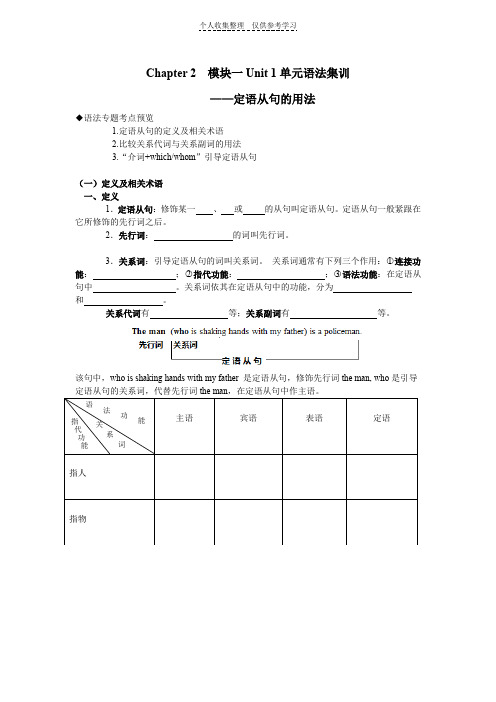
Chapter 2 模块一Unit 1单元语法集训——定语从句的用法◆语法专题考点预览1.定语从句的定义及相关术语2.比较关系代词与关系副词的用法3.“介词+which/whom”引导定语从句(一)定义及相关术语一、定义1.定语从句:修饰某一、或的从句叫定语从句。
定语从句一般紧跟在它所修饰的先行词之后。
2.先行词:的词叫先行词。
3.关系词:引导定语从句的词叫关系词。
关系词通常有下列三个作用:○1连接功能:;○2指代功能:;○3语法功能:在定语从句中。
关系词依其在定语从句中的功能,分为和。
关系代词有等;关系副词有等。
该句中,who is shaking hands with my father 是定语从句,修饰先行词the man, who是引导定语从句的关系词,代替先行词the man,在定语从句中作主语。
二、定语从句的种类以及区别定语从句分为定语从句和定语从句1. 限制性定语从句起限定作用,是主句不可缺少的部分,与先行词之间无逗号;翻译时常译成前置定语。
Those who want to go, please sign their names here. 想去的人请在这儿签名。
2. 非限制性定语从句起补充说明作用,省去后不影响主句的意思,并且常用逗号与主句隔开;翻译时常译成并列的分句。
A middle-aged woman killed her husband, which frightened me very much.一个中年女子杀害了自己的丈夫,这令我十分恐惧。
This note was left by John, who was here a moment ago. 这张纸条是约翰留的,他刚才来过这儿。
请看下面例句的不同含义:限制性:她有两个当解放军的儿子。
She has two sons who are P.L.非限制性:她有两个儿子,他们都是解放军。
She has two sons,关系代词which引导非限制性定语从句时,which可以指主句的全部内容,也可以是部分内容,从句只能位于先行词后。
2牛津高中英语模块一至四语法总结及练习
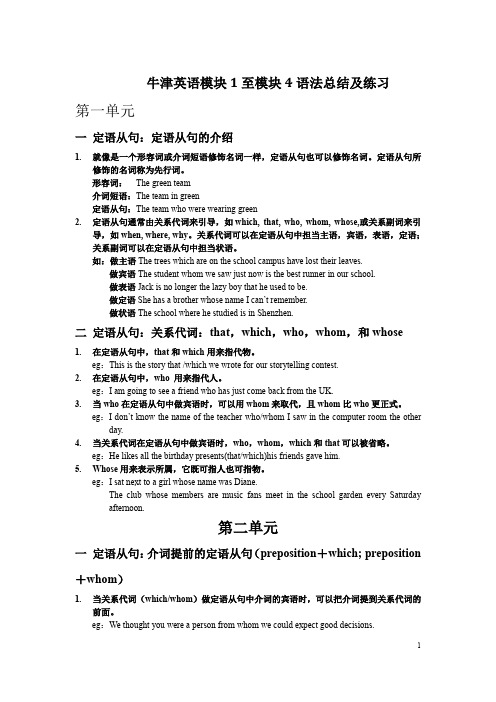
牛津英语模块1至模块4语法总结及练习第一单元一定语从句:定语从句的介绍1.就像是一个形容词或介词短语修饰名词一样,定语从句也可以修饰名词。
定语从句所修饰的名词称为先行词。
形容词:The green team介词短语:The team in green定语从句:The team who were wearing green2.定语从句通常由关系代词来引导,如which, that, who, whom, whose,或关系副词来引导,如when, where, why。
关系代词可以在定语从句中担当主语,宾语,表语,定语;关系副词可以在定语从句中担当状语。
如:做主语The trees which are on the school campus have lost their leaves.做宾语The student whom we saw just now is the best runner in our school.做表语Jack is no longer the lazy boy that he used to be.做定语She has a brother whose name I can’t remember.做状语The school where he studied is in Shenzhen.二定语从句:关系代词:that,which,who,whom,和whose1.在定语从句中,that和which用来指代物。
eg:This is the story that /which we wrote for our storytelling contest.2.在定语从句中,who 用来指代人。
eg:I am going to see a friend who has just come back from the UK.3.当who在定语从句中做宾语时,可以用whom来取代,且whom比who更正式。
2牛津高中英语模块一至四语法总结及练习

牛津英语模块1至模块4语法总结及练习第一单元一定语从句:定语从句的介绍1.就像是一个形容词或介词短语修饰名词一样,定语从句也能够修饰名词。
定语从句所修饰的名词称为先行词。
形容词:The green team介词短语:The team in green定语从句:The team who were wearing green2.定语从句通常由关系代词来引导,如which, that, who, whom, whose,或关系副词来引导,如when, where,why。
关系代词能够在定语从句中担当主语,宾语,表语,定语;关系副词能够在定语从句中担当状语。
如:做主语The trees which are on the school campus have lost their leaves.做宾语The student whom we saw just now is the best runner in our school.做表语Jack is no longer the lazy boy that he used to be.做定语She has a brother whose name I can’t remember.做状语The school where he studied is in Shenzhen.二定语从句:关系代词:that,which,who,whom,和whose1.在定语从句中,that和which用来指代物。
eg:This is the story that /which we wrote for our storytelling contest.2.在定语从句中,who 用来指代人。
eg:I am going to see a friend who has just come back from the UK.3.当who在定语从句中做宾语时,能够用whom来取代,且whom比who更正式。
2牛津高中英语模块一至四语法总结及练习

牛津英语模块1至模块4语法总结及练习第一单元一定语从句:定语从句的介绍1.就像是一个形容词或介词短语修饰名词一样,定语从句也可以修饰名词。
定语从句所修饰的名词称为先行词。
形容词:The green team介词短语:The team in green定语从句:The team who were wearing green2.定语从句通常由关系代词来引导,如which, that, who, whom, whose,或关系副词来引导,如when, where, why。
关系代词可以在定语从句中担当主语,宾语,表语,定语;关系副词可以在定语从句中担当状语。
如:做主语The trees which are on the school campus have lost their leaves.做宾语The student whom we saw just now is the best runner in our school.做表语Jack is no longer the lazy boy that he used to be.做定语She has a brother whose name I can’t remember.做状语The school where he studied is in Shenzhen.二定语从句:关系代词:that,which,who,whom,和whose1.在定语从句中,that和which用来指代物。
eg:This is the story that /which we wrote for our storytelling contest.2.在定语从句中,who 用来指代人。
eg:I am going to see a friend who has just come back from the UK.3.当who在定语从句中做宾语时,可以用whom来取代,且whom比who更正式。
牛津高中英语模块一语法定语从句知识

定语从句知识总结一、一般情况下,限制性定从关系代词的选用:例:1.The man who /that lives next door is friendly.2. Library is a building that/which stores lots of books for readers.3.The girl whom / that /不填 / who you have just seen is from America.4.I like the new computer that /which / 不填 my father bought for me.5.The girl whose hair is red is singing.=The girl of whom the hair is red is singing.6. The book whose cover is blue is mine.= The book of which the color is blue is mine.二. 关系副词的使用:当先行词在从句中做原因状语,用 why=for which; (例 1)当先行词在从句中做地点状语,用 where=at/in/ …+which(根据具体情况选择介词); (例 2) 当先行词在从句中做时间状语, 用 when=on/during/in/ …+ which(根据具体情况选择介词); (例 3)例:1. I don’t believe the reason why/for which he was late for school.区别: I don’t believe the reason that/which/ 不填 he gave me. (关系词指物,在从句中做宾语)2. This is the school where/in which I once studied.区别: This is the school which/that/ 不填 I once talked about last month. ( 关系词指物,在从句中 做宾语)3. I will never forget the day when/on which he joined the army.区别: I will never forget the day that/which/ 不填 I spent with him. (关系词指物, 在从句中做 宾语)三. 当关系词在从句中做表语时,通常用 that ,在口语中也可以省去。
牛津高中英语模块一至四语法总结及练习
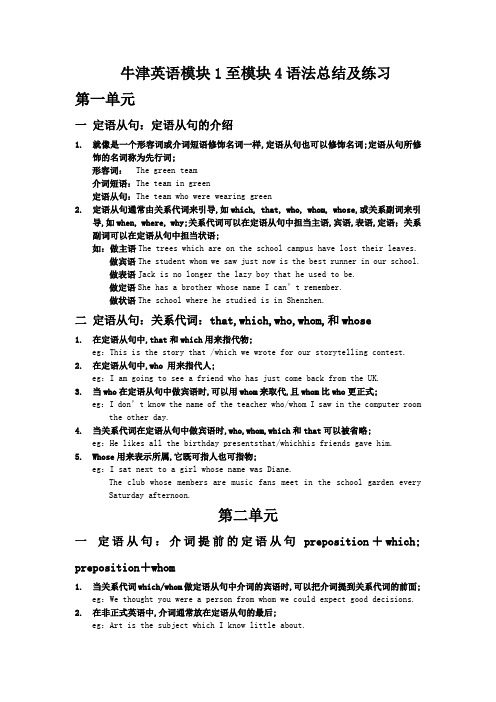
牛津英语模块1至模块4语法总结及练习第一单元一定语从句:定语从句的介绍1.就像是一个形容词或介词短语修饰名词一样,定语从句也可以修饰名词;定语从句所修饰的名词称为先行词;形容词:The green team介词短语:The team in green定语从句:The team who were wearing green2.定语从句通常由关系代词来引导,如which, that, who, whom, whose,或关系副词来引导,如when, where, why;关系代词可以在定语从句中担当主语,宾语,表语,定语;关系副词可以在定语从句中担当状语;如:做主语The trees which are on the school campus have lost their leaves.做宾语The student whom we saw just now is the best runner in our school.做表语Jack is no longer the lazy boy that he used to be.做定语She has a brother whose name I can’t remember.做状语The school where he studied is in Shenzhen.二定语从句:关系代词:that,which,who,whom,和whose1.在定语从句中,that和which用来指代物;eg:This is the story that /which we wrote for our storytelling contest.2.在定语从句中,who 用来指代人;eg:I am going to see a friend who has just come back from the UK.3.当who在定语从句中做宾语时,可以用whom来取代,且whom比who更正式;eg:I don’t know the name of the teacher who/whom I saw in the computer room the other day.4.当关系代词在定语从句中做宾语时,who,whom,which和that可以被省略;eg:He likes all the birthday presentsthat/whichhis friends gave him.5.Whose用来表示所属,它既可指人也可指物;eg:I sat next to a girl whose name was Diane.The club whose members are music fans meet in the school garden everySaturday afternoon.第二单元一定语从句:介词提前的定语从句preposition+which; preposition+whom1.当关系代词which/whom做定语从句中介词的宾语时,可以把介词提到关系代词的前面;eg:We thought you were a person from whom we could expect good decisions.2.在非正式英语中,介词通常放在定语从句的最后;eg:Art is the subject which I know little about.3.如果介词放在定语从句的最后,which 可以被that取代,whom可以被that和who取代;eg:Dad is a person whom/that/who I can easily talk to.4.当关系代词做定语从句中介词的宾语,并且介词又放在定语从句的末尾时,我们通常省略关系代词who和that;eg:The topic which Eric is interested in is Physics.Daniel is the person whom I want to make friends with.5.当先行词是way时,我们用in which或that来引导定语从句,这种情况下,in which或that 可以被省略;eg:I didn’t like the way that /in which she talked to me.二定语从句:关系副词:when,where,why1.我们通常用关系副词when 引导先行词是time,moment,day,season,year 等的定语从句;eg:Do you remember the day when we left you in chargeI often think of the moment when I saw the UFO.2.我们通常用关系副词where引导先行词是place,house,city,country,city,world等的定语从句;eg:The police searched the house where the thief had stayed.This is not a family where bad behavior goes unpunished.3.我们通常用关系副词why引导先行词是reason的定语从句;eg:I don’t know the reason why the house is so dirty.4.在更加正式的英语中,where,when和why能够被介词+which 所替代;eg:The study is the place where/in which I often have talks with my father.This is the reason why/for which my parents got home earlier.It rained the whole day when/on which he traveled with his family.第三单元一定语从句:非限制性定语从句1.非限制性定语从句是一个为主句添加额外信息的从句,在非限制性定语从句前通常有个逗号;eg:Amy, who took weight-loss pills, now realizes that health is important.My pills are in the bathroom, where I always keep them.2.当先行词是整个主句时,可以用which来引导定语从句;eg:He missed the show, which was a great pity.3.我们可以用all+whom/which 来表示全部数量,用some of+whom/which来表示部分数量;eg:I am doing different types of exercises, all of which are quite helpful to my health.Many people, some of whom are not overweight, are going on diet.定语从句练习1. Is this the factory __________ you visited the other dayA. thatB. whereC. in whichD. the one2. Is this factory __________ some foreign friends visited last FridayA. thatB. whereC. whichD. the one3. Is this the factory __________ he worked ten years agoA. thatB. whereC. whichD. the one4. The wolves hid themselves in the places __________ couldn’t be found.A. thatB. whereC. in whichD. in that5. The freezing point is the temperature __________ water changes into ice.A. at whichB. on thatC. in whichD. of what6. The reason is __________ he is unable to operate the machine.A. becauseB. whyC. thatD. whether7. I’ll tell you __________ he told me last week.A. all whichB. thatC. all thatD. which8. That tree, __________ branches are almost bare, is very old.A. whoseB. of whichC. in whichD. on which9. I have bought the same dress __________ she is wearing.A. asB. thatC. whichD. what10. We’re talking about the piano and the pianist _________ were in the concert we attended last night.A. whichB. whomC. whoD. that11. Anyone __________ this opinion may speak out.A. that againstsB. that againstC. who is againstD. who are against12. Didn’t you see the man __________I nodded just now B. whom I nodded just nowC. I nodded to him just nowD. I nodded to just now13. Is there anything __________ to youA. that is belongedB. that belongsC. that belongD. which belongs14. ---- “How do you like the book ”---- “It’s quite different from __________ I read last month.”A. thatB. whichC. the oneD. the one what15. Mr. Zhang gave the textbook to all the pupils except __________ whohad already taken them.A. the onesB. onesC. someD. the others16. The train __________ she was travelling was late.A. whichB. whereC. on whichD. in that17. It’s the third time __________ late this month.A. that you arrivedB. when you arrivedC. that you’ve arrivedD. when you’ve arrive d18. May the fourth is the day __________ we Chinese people will never forget.A. whichB. whenC. on whichD. about which19. Is it in that factory __________ “Red Flag” cars are producedA. in whichB. whereC. whichD. that20. He must be from Africa, __________ can be seen from his skin.A. thatB. asC. whoD. what21. He has two sons, __________ work as chemists.A. two of whomB. both of whomC. both of whichD. all of whom22. I, __________ your good friend, will try my best to help you out.A. who isB. who amC. that isD. what is23. I don’t like __________ you speak to her.A. the wayB. the way in thatC. the way whichD. the way of which24. The two things ______they felt very proud are Jim’s gold watch and Della’s hair.A. about whichB. of whichC. in whichD. for which25. Do you know which hotel __________A. she is stayingB. she is staying inC. is she stayingD. is she staying in26. Who can think of a situation __________ this idiom can be usedA. whichB. thatC. whereD. in that27. The astronaut did many experiments in the spaceship, ___much help for knowing space.which we think it is B. which we think are ofC. of which we think isD. I think which is of28. The great day we looked forward to __________ at lastA. comeB. cameC. comingD. comes29. I like the second football match __________ was held last week.A. whichB. whoC. thatD. /30. This is the very film _______ I've long wished to see.A. whichB. thatC. whoD. whom31.The house ______the capitalist used to live in is now a nursery.A. thatB. whereC. whatD. when32.The doctor did all_______ to save the wounded boy.A. what he couldB. he couldC. everything which he couldD. for which he could do33. _____you know, he is a famous musician.A. AsB. whichC. ThatD./34.He is the only one of the three______ got the new idea.A. who haveB. whom haveC. who hasD. whose had35.This is the baby____________ tomorrow.A. after whom I shall lookB. whom I shall look afterC. whose I shall look afterD. after whom I shall look after36. These students will graduate from the university next summer, __ they will have studied here for four years.A. by thenB. by that timeC. by what timeD. by which time37. This is the house the window __________ faces the south.A. of whichB. whichC. of itD. whose38. It is five o’clock in the aft ernoon _________ they arrived at the hotel.A. sinceB. beforeC. whenD. that39. In some countries, _____is called “equality” does not really mean equal rights for all people.A. whichB. whatC. thatD. one40. --- How about the games---Very interesting, and the ones _____the young men competed were really exciting A. what B. for whom C. where D. in which二附加疑问句1.附加疑问句是放在陈述句后面的短问句;它们通常被用在口语中来引出一段对话,以一个更加礼貌的方式来询问信息,温柔的发号施令或要求某人做某事;我们用附加疑问句来询问意见或征求同意;当我们用附加疑问句来询问意见时,为了期待对方能同意我们的观点,附加疑问句会用降调来表达;当我们用附加疑问句来征求同意时,我们实际上是在询问我们自己也不太能确信的事情,这时候附加疑问句会用升调来表达;2.附加疑问句的构成有以下几种:1 在肯定的陈述句之后,我们会用否定的附加疑问句;在否定的陈述句之后,我们会用肯定的附加疑问句;eg:We can still be friends, can’t weHe doesn’t like ice cream, does he当主句中有像neither,none,nobody,nothing,few,little,never,hardly或seldom这类词时,它们被认为是否定的,因此后面会跟个肯定的附加疑问句;eg:Neither of you will have coffee, will youNo one has found my CD, have theyNobody understood his speech, did theyHis sister seldom argues with people, does she人称代词如I,we,you,he,she,it或they会放在附加疑问句中;eg:I was pretty silly, wasn’t IEveryone has advises you not to go on a diet, haven’t you 助动词,情态动词或be动词会放在附加疑问句中;eg:You like traveling, don’t youThere is something wrong, isn’t thereYou can’t speak Italian, can you祁使句后用will you, Let’s后用shall weeg:Post a letter for me, will youLet’s have a break, shall we反意疑问句1 He hurt his leg when playing football. He is very unlucky, ____ heA isB didn’tC isn’tD does2 John is a diligent student who spends most of his time studying, ____ heA hadn’tB hadC doesD isn’t3 –They don’t answer the phone when I call.--There isn’t any one at home then, ___A isn’t thereB is thereC is itD isn’t it4 It seldom snows in winter in Shanghai, ___A doesn’t itB isn’t itC is itD does it5 She has already plans for the summer holidays, ____A hasn’t sheB isn’t sheC doesn’t sheD hadn’t it6 Mother loves reading. She never spends time watching TV, ____A does sheB will sheC have sheD doesn’t she7 It is the first time that she has been to the United States, ____A isn’t sheB isn’t itC hasn’t sheD hasn’t it8 I don’t think he is right, ___A do IB don’t IC is heD isn’t he第一单元一现在完成时态1.我们用现在完成时态来表示在最近的过去发生的但跟现在有联系的事情;eg:The disappearance of Justin has made Kelly very unhappy.2.我们也用现在完成时态来表示在过去刚开始,并且现在还没结束的事情;eg:I have not seen Justin since last Friday night.当动作发生的确切时间不清楚或不重要时,我们也用现在完成时态;经常连用的时间短语有:already, ever, for, just, lately, never, recently, since, yet, already 用于肯定句,yet用于否定句;eg:The boy has already come home.I haven’t heard anything from him yet.for+一段时间 since+点时间eg:We haven’t seen him for two years. We haven’t seen him since 2002.注:当已给定具体的时间时,我们往往用一般过去时态,而不是现在完成时态;我们用现在完成时态来谈论刚刚完成的动作;eg:The police have just finished searching the area.我们也用现在完成时态来表示重复的动作;eg:Some villages say that they have seen UFOs many times.现在完成时态的构成是:have/has+动词的过去分词二现在完成进行时态1.我们用现在完成进行时态来表示在过去发生的并且仍将继续的动作;eg:I have not been sleeping well since I returned home.2.我们用现在完成进行时态来表示刚刚结束但以某种方式和现在有联系的动作;eg:--- Sorry I’m late. Have you been waiting long--- Yes, I’ve been waiting for an hour.3.现在完成进行时态的构成:have/has +been +doing注:for和since和现在完成进行时态连用;eg:I have been waiting for a long time.He has been waiting since nine o’clock.三现在完成时态还是现在完成进行时态1.我们用现在完成时态来谈论刚刚完成的动作,用现在完成进行时态来表示发生在过去并且现在仍在发生的动作;eg:Li Jia has read a book about Stonehenge. She finished reading the book. Li Jia has been reading a book about Stonehenge. She is still reading the book.2.我们用现在完成时态表示重复的动作,用现在完成进行时态来表示不停的动作;eg:I have visited Egypt twice this month.I have been touring Egypt for two months.现在完成时态用于回答how many/much的提问,现在完成进行时态用于回答how long 的提问;eg:How many times have you swum in the lakeHow long have you been swimming in the lake3.状态动词和动作动词都可以用在现在完成时态中,但只有动作动词可以用在现在完成进行时态中;eg:I have had this camera for five years. 状态动词I have taken photos of UFO with this camera. 动作动词I have been taking photos of UFO with this camera. 动作动词注:动作动词表示发生或变化的动作,如go,play;状态动词表示保持不变的动作,如like, know,exist4.当 never,yet,already,ever出现在句子中时,只用现在完成时态,而不用现在完成进行时态;eg:I’ve never visited Paris.I’ve already been to Paris.第二单元一将来进行时态1.我们用将来进行时态来:1 谈论将来一段时间正在进行的事情;eg:Toby will be climbing in the Himalayas all next week2 谈论从将来的某一点开始并且有可能要持续一段时间的事情;eg:Toby will not be in London next Tuesday. He will be climbing in the Himalayas.3 没有任何意图的表达将来的事情;eg:The weather report says that it will be raining when we arrive in London.在这种情况下表示事情是很自然的发生的,没有人为的安排.4 礼貌地询问有关其他人将来的计划;eg:Will you be visiting your uncle in Tanzania2.将来进行时态的构成:1 陈述句:willnot+v-ingeg:Toby and his brother, Colin, will not be flying to Morocco.2 疑问句:will 提到主语的前面eg:Will they be flying to Morocco on 15th July3 回答:willnoteg:Yes, they will. /No, they will notwon’t二过去将来时态1.我们用过去将来时态和过去进行时态来:1 表示过去的将来某一时间要发生的动作;eg:They set off at 9 a.m. and would reach the airport an hour later.2 暗指一个过去的目的;eg:I was going to leave, but then it rained.3 暗指一个过去的安排;eg:Colin called Jennifer to say that he was seeing her later that afternoon.4 指代实际已经发生过的将来的动作;eg:The journey that was to change Toby’s life started in July that year. 2.陈述句中过去将来时态的构成:1 would +动词原形eg:I told you Colin and I would spend a few weeks traveling.2 was/were going to,was /were to , was/were about toeg:We were going to see the wild animals, but then we didn’t have time.It was his last day at school---he was to leave the next morning.Colin was about to get off the camel when a child ran towards him.第三单元一过去完成时态1.我们用一般过去时态来谈论一个过去的动作;当我们想要谈论比过去更早的时间里发生的事情时,就用过去完成时态;eg:Upon entering the tomb, Carter’s lucky pet bird, which had led him to the place, was eaten by a snake.2.在直接引语中,我们用过去完成时态来指代说话的时候就已经发生的动作;直接引语中的一般过去时态和现在完成时态在间接引语中改为过去完成时态;eg:“We emptied the tomb of everything it contained,” said Carter.------- Carter said that they had emptied the tomb of everything it contained. 3.过去完成时态只是指在另一个过去的动作之前发生的动作,并不是指发生在一长段时间以前的动作;eg:I had done my homework this morning before I went to the museum.4.过去完成时态经常跟以下引导的时间短语连用,如when, after, before, as soon as, until, since, by, for, already.eg:Then a few months after Carter had opened the tomb, Lord Carnarvon fell ill with a fever and died.5.过去完成时态的构成:had+v-edeg:Howard Carter had received money from Lord Carnarvon before he made his most amazing discovery.二现在完成时态还是过去完成时态1.当我们谈论一个与现在有关的过去的事情时,我们用现在完成时态;eg:Howard Carter is one of the most famous explorers the world has ever known.2.当我们在谈论过去,并要说明一个更早发生的动作的时候,我们就要用过去完成时态;eg:Not long after the tomb had been opened, people in Carter’s team began to fall ill and die strangly.语法复习模快二I 1—Alice’s second-hand computer_____ wrong although she used it only once.A goesB has goneC is goingD had gone2 Robert _____me his address the other day, but I’m afraid I ____it.A had given; lostB has given; have lostC gave ; have lostD gives; lost3 I____ nothing about it before you told me the newsA knowB knewC had knownD has known4 --What ____these days Still busy writing your new book--Yes, I think I can finish it next week.A do you doB have you been doingC have you doneD did you do5 --what was the film like--Well,I____ it____ very interesting.A thought; would beB thought; may beC think; is going to beD think; will be6 It was the third time that he ____us about his story.A has toldB toldC is tellingD had told7 I forget what I was taught, I only remember what I_____.A learnB learnedC have learnedD had learned8 My younger sister____ the Youth League ____2004.A has joined; inB has joined; sinceC had joined; sinceD joined; in9 –Where ____my pen I cann’t find it anywhere.--I ___it on this table, but now, it’s gone.A did you put; have putB have you put; putC had you put; was puttingD were you putting; have put10 She was praised for what she___.A had doneB has doneC would doD does11 I____ he would help me with my English, in fact he didn’t.A has thoughtB thoughtC thinkD had thought12 -- Tom, your shirt is so dirty-- Mom, I ___our storeroom downstairs and I will wash it after finishing the cleaning.A cleanedB have cleanedC was cleaningD have been cleaning13 They___ friends since they met in New York.A have madeB have becomeC have beenD have turned14 Nobody but the twins___ some interest in the project till now.A showsB showC have shownD has shown15.The students don’t want to have their supper until they ____ their experiment.A finishedB have finishedC had finishedD will finish16 By now students in Grade One ____ 1,700 English words and phrases.A should learnB have learnedC learnedD learn17 –Sorry to have kept you waiting--I _____ here for fifty minutes.A have arrivedB have gotC have reachedD have been18 –Where have you been I ____you the whole day.--I was in the library reading magazines.A have been telephoningB had telephonedC telephonedD was telephoned19 –Hi, Tracy , you look tired.--I am tired. I____ the living room all day.A paintedB had paintedC have been paintingD have painted20 –why didn’t you come yesterday--I ____ ,but I had an unexpected visitor.A hadB wouldC was going toD did21 –Will you be free at three o’clock tomorrow afternoon.--No, I __ a meeting at that time.A will haveB was going to haveC will be havingD would have22 –What were you doing when I phoned you yesterday.--I ____ just finished my homework and ___to watch TV.A have; am goingB have; was goingC had; was goingD had; am going23 –My father will be here tomorrow.--Oh, I thought that he ___ today.A was comingB is comingC will comeD comes24 When we reach New York, it ____.A probably will rain Bwill probably be rainingC is probably rainingD has probably rained25—Is this the last exam we have to take this term--Yes, but there ___ another test three months from now.A hasB isC wasD will be26 It was said that the machine ___ sometime the next week.A had been repairedB would repairC was to be repairedD needs repairing27 –Why did you buy this paint so early--I ___ my bedroom tomorrow, but I changed my mind.A was going to paintB am going to paintC am paintingD will paint28 At this time tomorrow I __ a report in my office and I __ by noon.A will be writing C will have finishedB will write D will finish29 _____打算 see Mr. Li this evening.30--Have you cleaned your room--Sorry, I haven’t. But I ____表意愿go and clean it at once.31 The journey that _______change Toby’s life started in July that year. 必然的情况32 I told you Colin and I _______spend a few weeks traveling. 过去将来时33 We __________ see the wild animals, but then we didn’t have time.过去的打算34 I ____ show you the photo ___ I was interrupted.正打算名词性从句名词性从句相当于名词,可分别作主句的主语、表语、宾语和同位语;因此,名词性从句厅分为主语从句、表语从句、宾语从句和同位从句;一引导名词性从句的连接词1、连接代词:who, whose, whom, what, which;有词义,在从句中担任成分,如主语、表语、宾语、或定语等;2、连接副词:when, where, why, how;有词义,在从句中担任成分,作状语;3、连接词:that, whether, if, as if;that 无词义,在从句中不担任成分,有时可省略;if whether, as if虽有词义,但在从句中不担任成分;注意:连接代词与连接副词在句中不再是疑问句,因而从句中谓语不用疑问式;连接代词与连接副词在从句充当句子成分,连接词whether 和if是否,as if好象在从句中不充当句子成分,只起连接作用;根据句义,如果连接代词与连接副词,whether、if 和as if都用不上时,才用that作连接词that本身无任何含义;二主语从句1、主语从句在复合句作主语;e.g. Who will go is not important.2、用it作形式主语,主语从句放在句末;e.g. It doesn’t matter so much whether you will come or not.3、that引导主语从句时,不能省略;e.g. That he suddenly fell ill last week made us surprised.三表语从句1、表语从句在复合句中作表语,位于系动词之后;e.g. The question was who could go there.2、引导表语从句的连接词that有时可省去;e.g. My idea is that we can get more comrades to help in the work.四宾语从句1、宾语从句在复合句中作宾语;引导宾语从句的连词that一般可省略;e.g. I hope that everything is all right.2、介词之后的宾语从句,不可用which或if连接,要分别用what或 whether;e.g. I’m interested in whether you’ve finished the work..I’m interested in what you’ve said.3、whether与if都可以引导宾语从句,常可互换;但下面情况不能互换;①宾语从句是否定句时,只用if,不用whether;e.g. I wonder if it doesn’t rain.②用if 会引起误解,就要用whether;e.g. Please let me know whether you want to go.此句如果把whether改成if,容易当成条件句理解③宾语从句中的whether 与or not直接连用,就不能换成if;不直接连用,可换;e.g. I don’t know whether or not the report is true.I don’t know whether/ if the report is true or not.④介词后的宾语从句要用whether引导;whether 可与不定式连用;whether也可引导主语从句、表语从句、同位语从句,还可引导让步状语从句,以上均不能换成if;但引导条件从句时,只能用if,而不能用whether;e.g. It depends on whether we have enough time.They don’t know whether to go there.Please come to see me if you have time.五同位语从句同位语从句在句中作某一名词的同位语,一般位于该名词如:news, fact, idea, suggestion, promise等之后,说明该名词的具体内容;e.g. I have no idea when he will be back.The fact that he had not said anything surprised everybody.练习:1.The fact ____ she works hard is well known to us all.A. thatB. whatC. whyD. which2.The fact ____ he was successful proves his ability.A. thatB. whatC. whichD. why3.The news ____ he was kidnapped surprised us greatly.A. whatB. thatC. whyD. when4.His suggestion ____ the meeting be delayed was turned down.A. whichB. thatC./D. it5.I have no idea ____ he will start.A. whenB. thatC. whatD./6.I've come from the government with a message ____ the meeting won't be held tomorrow.A. ifB. thatC. whetherD. which7.The thought ____ he might fail in the exam worried him.A. whenB. whichC. whatD. that8.The order ____ the prisoner be set free arrived too late.A. whichB. whetherC. thatD. what9.The nurses are trying their best to reduce the patient's fear ____ he would die of the disease.A. thatB. asC. of whichD. which10.He often asked me the question ____ the work was worth doing.A. whetherB. whereC. thatD. when11. Along with the letter was his promise ____ he would visit me this coming Christmas.A. whichB. thatC. whatD. whether12. The other day, my brother drove his car down the street at ____ I thought wasa dangerous speed.A. asB. whichC. whatD. that13. Luckily, we’d brought a road map without ____ we would have lost our way.A. itB. thatC. thisD. which14.There are signs ____ restaurants are becoming more popular with families.A. thatB. whichC. in whichD. whose15. We can see the same signs ____ stand out throughout the city.A. thatB. whichC. in whichD. whose主谓一致在英语句子里,谓语受主语支配,其动词必须和主语在人称和数上保持一致,这就叫主谓一致;寻其规律,大致可归纳为三个原则,即语法一致、逻辑意义一致和就近一致原则;一语法一致原则:语法上一致就是谓语动词和主语在单、复数形式上保持一致;1、以单数名词或代词、动词不定式短语、动名词短语或从句作主语时,谓语动词一般用单数形式;主语为复数时,谓语动词用复数形式;如:His father is working on the farm. / To study English well is not easy. / What he said is very important for us all./ The children were in the classroom two hours ago. / Reading in the sun is bad for your eyes.注意:由what引导的主语从句,后面的谓语动词多数情况用单数形式,但若表语是复数或what从句是一个带有复数意义的并列结构时,主句的谓语动词用复数形式;如:What I bought were three English books. / What I say and do is are helpful to you.2、由连接词and或both … and连接起来的合成主语后面,要用复数形式的谓语动词;如:Lucy and Lily are twins. / She and I are classmates. / The boy and the girl were surprised when they heard the news. / Both she and he are Young Pioneers.注意:①若and所连接的两个词是指同一个人或物时,它后面的谓语动词就应用单数形式;如:The writer and artist has come.; / ②由and连接的并列单数主语前如果分别有no, each, every more than a an , many a an修饰时,其谓语动词要用单数形式;如:Every student and every teacher was in the room.. / No boy and no girl likes it.3、主语为单数名词或代词,尽管后面跟有with, together with, except, but, like, as well as, rather than, more than, no less than, besides, including等引起的短语,谓语动词仍用单数形式;若主语为复数,谓语用复数形式;如:Mr Green, together with his wife and children, has come to China. / Nobody but Jim and Mike was on the playground. / She, like you and Tom, is very tall.4、either, neither, each, every 或no +单数名词和由some, any, no, every构成的复合不定代词,都作单数看待;如:Each of us has a new book. / Everything around us is matter.注意:①在口语中当either或neither后跟有“of+复数名词或代词”作主语时,其谓语动词也可用复数;如:Neither of the texts is are interesting. ②若none of后面的名词是不可数名词,它的谓语动词就要用单数;若它后面的名词是复数,它的谓语动词用单数或复数都可以;如:None of us has have been to America.5、在定语从句时,关系代词that, who, which等作主语时,其谓语动词的数应与句中先行词的数一致;如:He is one of my friends who are working hard. / He is the only one of my friends who is working hard.6、如果集体名词指的是整个集体,它的谓语动词用单数;如果它指集体的成员,其谓语动词就用复数形式;这些词有family, class, crowd, committee, population, audience 等;如:Class Four is on the third floor. / Class Four are unable to agree upon a monitor.注意:people, police, cattle等名词一般都用作复数;如:The police are looking for the lost child.7、由“a lot of, lots of, plenty of, the rest of, the majority of + 名词”构成的短语以及由“分数或百分数+名词”构成的短语作主语,其谓语动词的数要根据短语中后面名词的数而定;如:There are a lot of people in the classroom. / The rest of the lecture is wonderful. / 50% of the students in our class are girls.注意: a number of“许多”,作定语修饰复数名词,谓语用复数;the number of“…的数量”,主语是number,谓语用单数;8、在倒装句中,谓语动词的数应与其后的主语一致;如:There comes the bus./ On the wall are many pictures. / Such is the result. / Such are the facts.二逻辑意义一致原则:逻辑意义一致就是谓语动词的数必须和主语的意义一致因有时主语形式为单数,但意义为复数;有时形式为复数,但意义为单数;1、what, who, which, any, more, all等代词可以是单数,也可是复数,主要靠意思来决定;如:Which is your bag / Which are your bags / All is going well. / All have gone to Beijing.2、表示“时间、重量、长度、价值”等的名词的复数作主语时,谓语动词通常用单数形式, 这是由于作主语的名词在概念上是一个整体,如:Thirty minutes is enough for the work.3、若英语是书名、片名、格言、剧名、报名、国名等的复数形式,其谓语动词通常用单数形式;如:“The Arabian Nights”is an interesting story-book.4、表数量的短语“one and a half”后接复数名词作主语时,其谓语动词可用单数形式也可用复数;如:One and a half apples is are left on the table.5、算式中表示数目字的主语通常作单数看待,其谓语动词采用单数形式;如:Twelve plus eight is twenty. / Fifty-six divided by eight is seven.6、一些学科名词是以–ics 结尾,如:mathematics, politics, physics 以及news, works等,都属于形式上是复数的名词,实际意义为单数名词,它们作主语时,其谓语动词要用单数形式;如:The paper works was built in 1990. / I think physics isn’t easy to study.7、trousers, glasses, clothes, shoes, 等词作主语时,谓语用复数,但如果这些名词前有a the pair of等量词修饰时,谓语动词用单数;如:My glasses are broken. / The pair of shoes under the bed is his.8、“定冠词the + 形容词或分词”,表示某一类人时,动词用复数;三就近一致原则:在英语句子中,有时谓语动词的人称和数与最近的主语保持一致;1、当两个主语由either … or, neither … nor, whether … or …, not only … but also连接时,谓语动词和邻近的主语一致;如:Either the teacher or the students are our friends. / Neither they nor he is wholly right. / Is neither he nor they wholly right2、there be句型be动词单复数取决于其后的主语;如果其后是由and连接的两个主语,则应与靠近的那个主语保持一致;如:There are two chairs and a desk in the room..注意:Here引导的句子用法同上;练习:1.I, who____ your friend, will try my best to help you with yourEnglish.A.amB.isC.areD.be2. The rich ____ not always happy.A.areB.isC.hasD.have3. Neither Tom nor Jack and I ____ his students.A.areB.amC.isD.was4. Mary as well as her sisters ____ Chinese in China.A. are studyingB. have studiedC. studiesD. study5. Neither my father nor I ____ at home.A.amB.isC.areD.be6. Not only my brother but also I ____ good at painting. Both of us ____ good painters.,A.are;areB.am;amC.ani;areD.is;is7. Every' boy and every girl ____ to attend the evening party.A.wishB.wishesC.is likeD.like8. Over 80 percent of the population of China ____ peasants.A.wasB.isC. would beD.are9. The population of China ____ larger than that of .any other country in the world.A.isB.areC.hasD.have10. Every means ____ tried but without any result.A. have beenB.is to beC.are to beD. has been11. Alice, together with two boys,____ for having broken the rule.A. was punishedB. punishedC. were punishedD. being punished12. The League secretary and the monitor____ asked to attend the .meeting this afternoon.A.isB.wasC.areD.is being13. The great writer and professor____.A. is an old manB. are both oldmenC. is an old man and a young manD. were twoChinese14. There ____ a pen, two pencils and three books on the desk.A.areB.isC.hasD.have15. A large number of students in our class____ girls.A. areB. wasC. isD. be16. The number of deer, mountain lions and wild roses ____ much if people leave things as they are.A. doesn' t changeB.don't changeC.changeD.changed。
2牛津高中英语模块一至四语法总结及练习.doc

牛津英语模块1至模块4语法总结及练习第一单元一定语从句:定语从句的介绍1.就像是一个形容词或介词短语修饰名词一样,定语从句也可以修饰名词。
定语从句所修饰的名词称为先行词。
形容词:The green team介词短语:The team in green定语从句:The team who were wearing green2.定语从句通常由关系代词来引导,如which, that, who, whom, whose,或关系副词来引导,如when, where, why。
关系代词可以在定语从句中担当主语,宾语,表语,定语;关系副词可以在定语从句中担当状语。
如:做主语The trees which are on the school campus have lost their leaves.做宾语The student whom we saw just now is the best runner in our school.做表语Jack is no longer the lazy boy that he used to be.做定语She has a brother whose name I can’t remember.做状语The school where he studied is in Shenzhen.二定语从句:关系代词:that,which,who,whom,和whose1.在定语从句中,that和which用来指代物。
eg:This is the story that /which we wrote for our storytelling contest.2.在定语从句中,who 用来指代人。
eg:I am going to see a friend who has just come back from the UK.3.当who在定语从句中做宾语时,可以用whom来取代,且whom比who更正式。
2牛津高中英语模块一至四语法总结材料及练习

牛津英语模块1至模块4语法总结与练习第一单元一定语从句:定语从句的介绍1.就像是一个形容词或介词短语修饰名词一样,定语从句也可以修饰名词。
定语从句所修饰的名词称为先行词。
形容词:The green team介词短语:The team in green定语从句:The team who were wearing green2.定语从句通常由关系代词来引导,如which, that, who, whom, whose,或关系副词来引导,如when, where, why。
关系代词可以在定语从句中担当主语,宾语,表语,定语;关系副词可以在定语从句中担当状语。
如:做主语The trees which are on the school campus have lost their leaves.做宾语The student whom we saw just now is the best runner in our school.做表语Jack is no longer the lazy boy that he used to be.做定语She has a brother whose name I can’t remember.做状语The school where he studied is in Shenzhen.二定语从句:关系代词:that,which,who,whom,和whose1.在定语从句中,that和which用来指代物。
eg:This is the story that /which we wrote for our storytelling contest.2.在定语从句中,who 用来指代人。
eg:I am going to see a friend who has just e back from the UK.3.当who在定语从句中做宾语时,可以用whom来取代,且whom比who更正式。
2牛津高中英语模块一至四语法总结及练习
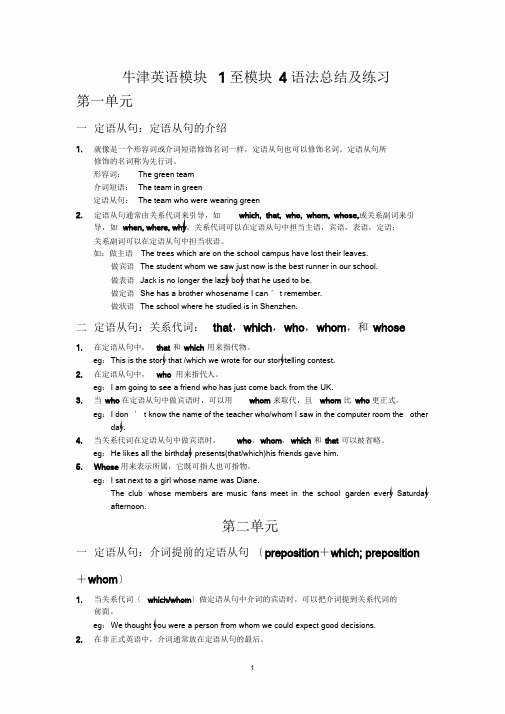
牛津英语模块 1 至模块4 语法总结及练习第一单元一定语从句:定语从句的介绍1. 就像是一个形容词或介词短语修饰名词一样,定语从句也可以修饰名词。
定语从句所修饰的名词称为先行词。
形容词:The green team介词短语:The team in green定语从句:The team who were wearing green2. 定语从句通常由关系代词来引导,如which, that, who, whom, whose,或关系副词来引导,如when, where, why。
关系代词可以在定语从句中担当主语,宾语,表语,定语;关系副词可以在定语从句中担当状语。
如:做主语The trees which are on the school campus have lost their leaves.做宾语The student whom we saw just now is the best runner in our school.做表语Jack is no longer the lazy boy that he used to be.做定语She has a brother whosename I can ’t remember.做状语The school where he studied is in Shenzhen.二定语从句:关系代词:that,which,who,whom,和whose1. 在定语从句中,that 和which 用来指代物。
eg:This is the story that /which we wrote for our storytelling contest.2. 在定语从句中,who 用来指代人。
eg:I am going to see a friend who has just come back from the UK.3. 当who 在定语从句中做宾语时,可以用whom 来取代,且whom 比who 更正式。
牛津高中英语模块一定语从句详解附习题。
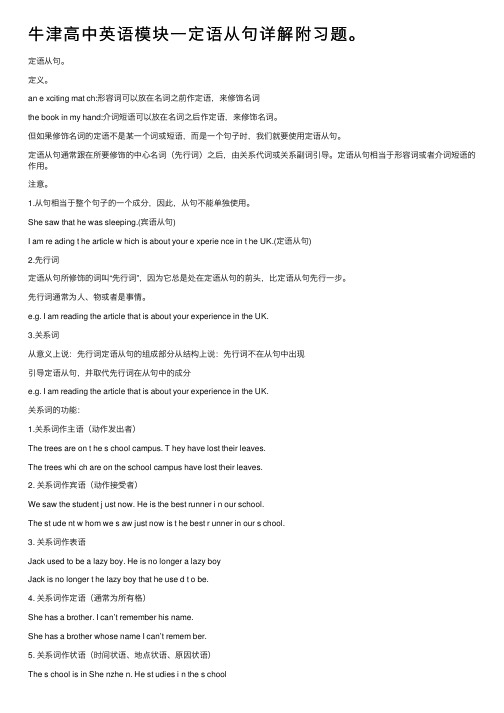
⽜津⾼中英语模块⼀定语从句详解附习题。
定语从句。
定义。
an e xciting mat ch:形容词可以放在名词之前作定语,来修饰名词the book in my hand:介词短语可以放在名词之后作定语,来修饰名词。
但如果修饰名词的定语不是某⼀个词或短语,⽽是⼀个句⼦时,我们就要使⽤定语从句。
定语从句通常跟在所要修饰的中⼼名词(先⾏词)之后,由关系代词或关系副词引导。
定语从句相当于形容词或者介词短语的作⽤。
注意。
1.从句相当于整个句⼦的⼀个成分,因此,从句不能单独使⽤。
She saw that he was sleeping.(宾语从句)I am re ading t he article w hich is about your e xperie nce in t he UK.(定语从句)2.先⾏词定语从句所修饰的词叫“先⾏词”,因为它总是处在定语从句的前头,⽐定语从句先⾏⼀步。
先⾏词通常为⼈、物或者是事情。
e.g. I am reading the article that is about your experience in the UK.3.关系词从意义上说:先⾏词定语从句的组成部分从结构上说:先⾏词不在从句中出现引导定语从句,并取代先⾏词在从句中的成分e.g. I am reading the article that is about your experience in the UK.关系词的功能:1.关系词作主语(动作发出者)The trees are on t he s chool campus. T hey have lost their leaves.The trees whi ch are on the school campus have lost their leaves.2. 关系词作宾语(动作接受者)We saw the student j ust now. He is the best runner i n our school.The st ude nt w hom we s aw just now is t he best r unner in our s chool.3. 关系词作表语Jack used to be a lazy boy. He is no longer a lazy boyJack is no longer t he lazy boy that he use d t o be.4. 关系词作定语(通常为所有格)She has a brother. I can’t remember his name.She has a brother whose name I can’t remem ber.5. 关系词作状语(时间状语、地点状语、原因状语)The s chool where he studies is i n S henz hen.4.定语从句分为限制性定语从句和⾮限制性定语从句。
牛津高中英语模块一至四语法总结材料及练习
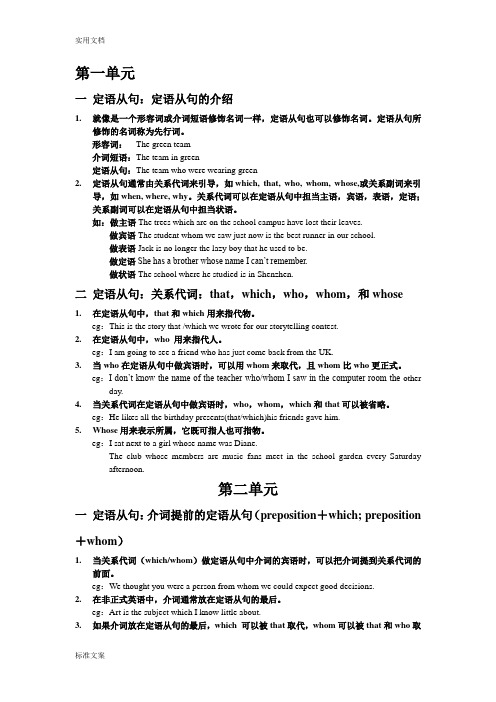
第一单元一定语从句:定语从句的介绍1.就像是一个形容词或介词短语修饰名词一样,定语从句也可以修饰名词。
定语从句所修饰的名词称为先行词。
形容词:The green team介词短语:The team in green定语从句:The team who were wearing green2.定语从句通常由关系代词来引导,如which, that, who, whom, whose,或关系副词来引导,如when, where, why。
关系代词可以在定语从句中担当主语,宾语,表语,定语;关系副词可以在定语从句中担当状语。
如:做主语The trees which are on the school campus have lost their leaves.做宾语The student whom we saw just now is the best runner in our school.做表语Jack is no longer the lazy boy that he used to be.做定语She has a brother whose name I can’t remember.做状语The school where he studied is in Shenzhen.二定语从句:关系代词:that,which,who,whom,和whose1.在定语从句中,that和which用来指代物。
eg:This is the story that /which we wrote for our storytelling contest.2.在定语从句中,who 用来指代人。
eg:I am going to see a friend who has just come back from the UK.3.当who在定语从句中做宾语时,可以用whom来取代,且whom比who更正式。
eg:I don’t know the name of the teacher who/whom I saw in the computer room the other day.4.当关系代词在定语从句中做宾语时,who,whom,which和that可以被省略。
2牛津高中英语模块一至四语法总结及练习

牛津英语模块1至模块4语法总结及练习第一单元一定语从句:定语从句的介绍1.就像是一个形容词或介词短语修饰名词一样,定语从句也可以修饰名词。
定语从句所修饰的名词称为先行词。
形容词:The green team介词短语:The team in green定语从句:The team who were wearing green2.定语从句通常由关系代词来引导,如which, that, who, whom, whose,或关系副词来引导,如when, where, why。
关系代词可以在定语从句中担当主语,宾语,表语,定语;关系副词可以在定语从句中担当状语。
如:做主语The trees which are on the school campus have lost their leaves.做宾语The student whom we saw just now is the best runner in our school.做表语Jack is no longer the lazy boy that he used to be.做定语She has a brother whose name I can’t remember.做状语The school where he studied is in Shenzhen.二定语从句:关系代词:that,which,who,whom,和whose1.在定语从句中,that和which用来指代物。
eg:This is the story that /which we wrote for our storytelling contest.2.在定语从句中,who 用来指代人。
eg:I am going to see a friend who has just e back from the UK.3.当who在定语从句中做宾语时,可以用whom来取代,且whom比who更正式。
2牛津高中英语模块一至四语法总结及练习

牛津英语模块1至模块4语法总结及练习第一单元一定语从句:定语从句的介绍1.就像是一个形容词或介词短语修饰名词一样,定语从句也可以修饰名词。
定语从句所修饰的名词称为先行词。
形容词:The green team介词短语:The team in green定语从句:The team who were wearing green2.定语从句通常由关系代词来引导,如which, that, who, whom, whose,或关系副词来引导,如when, where, why。
关系代词可以在定语从句中担当主语,宾语,表语,定语;关系副词可以在定语从句中担当状语。
如:做主语The trees which are on the school campus have lost their leaves.做宾语The student whom we saw just now is the best runner in our school.做表语Jack is no longer the lazy boy that he used to be.做定语She has a brother whose name I can’t remember.做状语The school where he studied is in Shenzhen.二定语从句:关系代词:that,which,who,whom,和whose1.在定语从句中,that和which用来指代物。
eg:This is the story that /which we wrote for our storytelling contest.2.在定语从句中,who 用来指代人。
eg:I am going to see a friend who has just come back from the UK.3.当who在定语从句中做宾语时,可以用whom来取代,且whom比who更正式。
2牛津高中英语模块一至四语法总结及练习11
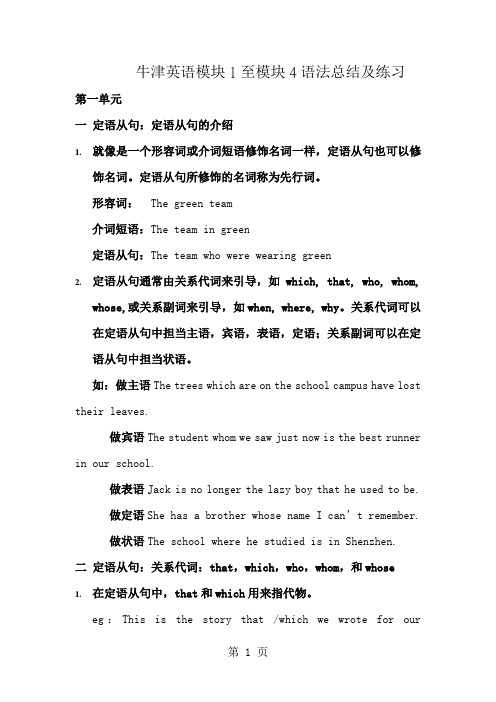
牛津英语模块1至模块4语法总结及练习第一单元一定语从句:定语从句的介绍1.就像是一个形容词或介词短语修饰名词一样,定语从句也可以修饰名词。
定语从句所修饰的名词称为先行词。
形容词:The green team介词短语:The team in green定语从句:The team who were wearing green2.定语从句通常由关系代词来引导,如which, that, who, whom,whose,或关系副词来引导,如when, where, why。
关系代词可以在定语从句中担当主语,宾语,表语,定语;关系副词可以在定语从句中担当状语。
如:做主语The trees which are on the school campus have lost their leaves.做宾语The student whom we saw just now is the best runner in our school.做表语Jack is no longer the lazy boy that he used to be.做定语She has a brother whose name I can’t remember.做状语The school where he studied is in Shenzhen.二定语从句:关系代词:that,which,who,whom,和whose1.在定语从句中,that和which用来指代物。
eg:This is the story that /which we wrote for ourstorytelling contest.2.在定语从句中,who 用来指代人。
eg:I am going to see a friend who has just come back from the UK.3.当who在定语从句中做宾语时,可以用whom来取代,且whom比who更正式。
- 1、下载文档前请自行甄别文档内容的完整性,平台不提供额外的编辑、内容补充、找答案等附加服务。
- 2、"仅部分预览"的文档,不可在线预览部分如存在完整性等问题,可反馈申请退款(可完整预览的文档不适用该条件!)。
- 3、如文档侵犯您的权益,请联系客服反馈,我们会尽快为您处理(人工客服工作时间:9:00-18:30)。
( ) 那个人。 a) 他就是 我昨天见到的 那个人。 ①He is the man. ②I saw him yesterday. He is the man whom I saw yesterday. 那个人吗? b) 你认识 站在那边的 那个人吗? ( ) ①Do you know the man? ②He is standing over there. Do you know the man who is standing over there?
3)which, that 所代替的先行词是事物 的名词或代词,在从句中可作主语、 的名词或代词,在从句中可作主语、宾语 等。 例如 : 工厂。 a) 这是 我们去年参观的) 。 工厂 ( ①This is the factory. ②We visited it last year. This is the factory which / that we visited last year. 可以省略 说明:关系代词在定语从句中作宾语时可 说明:关系代词在定语从句中作宾语时可 以省略。 以省略。
原因吗? c) 你知道 他迟到的 原因吗? ( ) ①Do you know the reason? ②He was late for that reason. Do you know the reason why he was late? 或 Do you know the reason for which he was late? 当先行词是指时间、地点或原因时, 2)当先行词是指时间、地点或原因时,并 非就用when, 非就用when, where, why 来引导定语 从句。 例如: 从句。 例如:
二、用法 1、关系代词引导的定语从句 关系代词所代替的先行词是人或物的名 词或代词,并在句中充当主语、宾语、 词或代词,并在句中充当主语、宾语、定 语等成分。 语等成分。关系代词在定语从句中作主语 时,从句谓语动词的人称和数要和先行词 保持一致。 保持一致。 1)who(主格), whom(宾格), that who(主格) whom(宾格) 这些词代替的先行词是人的名词或代 在从句中作主语和宾语。例如: 词,在从句中作主语和宾语。例如:
3、判断关系代词与关系副词 方法一: 用关系代词,还是关系副词完全 方法一: 用关系代词, 取决于从句中的谓语动词。 取决于从句中的谓语动词。及物动词后面 无宾语,就必须要求用关系代词; 无宾语,就必须要求用关系代词;而不及 物动词则要求用关系副词。例如: 物动词则要求用关系副词。例如: This is the mountain village where I stayed last year. 这是我去年呆过的山村。 这是我去年呆过的山村。 I'll never forget the days when I worked together with you. 我永远不会忘记与你共事的日子。 我永远不会忘记与你共事的日子。
房屋。 b) 这就是 我们去年住的 房屋。 ( ) ①This is the house. ②We lived in it last year. This is the house where we lived last year. 或 This is the house in which we lived last year. 或 This is the house which we lived in last year.
me. §The boy is Tom. He sits in front of me.
用来指人或物。 例如: 2)whose 用来指人或物。 例如: 小明,他的父亲是工程师, a) 小明,他的父亲是工程师,是我们班级 ( ) 里最好的学生。 里最好的学生。 ①Xiao Ming is the best studineer. Xiao Ming whose father is an engineer is the best student in our class. 注意: 注意:定语从句应紧跟在先行词的后面 即定语从句所修饰的词) (即定语从句所修饰的词)
3.After living in Pairs for fifty years he returned to the small child. town ____ he grew up as a child. B A. which B. where C. that D. when 4.He lived in London for 3 months, during ____ time he learned some B English. English. A. this B. which C. that D. same
the the the the
handsome tall strong clever
boy
The boy is Tom.
The boy who is handsome is Tom. The boy who is tall is Tom. The boy who is strong is Tom. The boy who is clever is Tom
smiling. §The boy is Tom. The boy is smiling.
The boy who is smiling is Tom. 主语) (主语)
§The boy is Tom. The boy has a round face. face.
The boy who has a round face is Tom.
方法二: 准确判断先行词在定语从句中的 方法二: 成分( ),也能正确选 成分(主、谓、宾、定、状),也能正确选 择出关系代词/关系副词 关系副词。 择出关系代词 关系副词。 B 例1. Is this the museum _____ you visited a few days ago? A. where B. that C. on which D. the one D 例2. Is this museum _____ you visited a few days ago? A. where B. that C. on which D. the one
Grammar Grammar Grammar Grammar Grammar Grammar Grammar Grammar
定
语法知识
语 从 句
一、概念 定语从句在句中做定语, 定语从句 在句中做定语,修饰一个名 在句中做定语 词或代词, 词或代词,被修饰的名词词组或代词即先行 词。定语从句通常出现在先行词之后,由关 定语从句通常出现在先行词之后, 系词(关系代词或关系副词)引出。 系词(关系代词或关系副词)引出 。 关系代词有: 关系代词有:who, whom, whose, which等 that, which等。 关系副词有: 关系副词有:when, where, why等。 why等
1)关系副词when, where, why 的含 关系副词when, 介词+ 结构, 义相当于 “介词+ which” 结构,因此常 常和“介词+ which”结构交替使用 例如: 结构交替使用。 常和“介词+ which”结构交替使用。例如: 那一天。 a) 我仍然记得 我参军的) 那一天。 ( ①I still remember the day. ②On that day I joined the army. I still remember the day when I joined the army. 或 I still remember the day on which I joined the army.
4、关系代词 that 的用法 介词后不能用。 1)不用 that 的情况 介词后不能用。 例如: 例如: We depend on the land from which we get our food. 我们依赖土地获得食物。 我们依赖土地获得食物。 We depend on the land that / from. which we get our food from. 2)只能用 that 作为定语从句的关系代 词 的情况
5.I had neither a raincoat nor an umbrella. B through. umbrella. _____ I got wet through. It’s That’s A. It s the reason B. That s why There’s It’s C. There s why D. It s how
工厂。 b) 这是 去年建造的) 。 工厂 ( ①This is the factory. ②It was built last year. This is the factory which / that was built last year. 不可以省略 2、关系副词引导的定语从句 关系副词可代替的先行词是时间、 关系副词可代替的先行词是时间、地 点或理由的名词,在从句中作状语。 点或理由的名词,在从句中作状语。
A don’t 6.I don t like _____ you speak to her. her. A.the way that B.the way in that C.the way which D.the way of that
下面请看定语从句语法( 下面请看定语从句语法(二)
The Attributive Clause
定语从句练习
1.His parents wouldn’t let him D marry anyone ______ family was poor. poor. A. of whom B. whom C. of whose D. whose 2.In the dark street, there wasn’t D a single person _____ she could help. turn for help. A. that B. who C. from whom D. to whom
